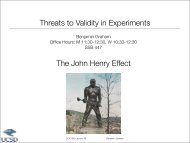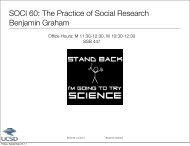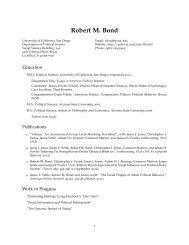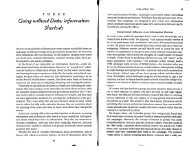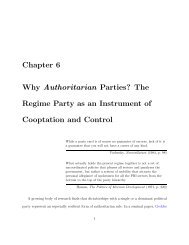The Third-Person Effect in Communication W. Phillips Davison The ...
The Third-Person Effect in Communication W. Phillips Davison The ...
The Third-Person Effect in Communication W. Phillips Davison The ...
Create successful ePaper yourself
Turn your PDF publications into a flip-book with our unique Google optimized e-Paper software.
W. PHILLIPS DAVISON<br />
<strong>Third</strong>-<strong>Person</strong> <strong>Effect</strong> <strong>in</strong> the Literature<br />
Numerous scholars seem to have noted what has here been called<br />
the third-person effect, but none so far as I know has paused to<br />
comment on it. For example, the hypothesis seems to be supported<br />
by several studies of the "Roots" television series. First aired <strong>in</strong><br />
January 1977, this eight-part dramatization of Alex Haley's story<br />
about his forebears' pa<strong>in</strong>ful progress from Africa, through slavery,<br />
<strong>in</strong>to the post-civil war period <strong>in</strong> the United States attracted over 130<br />
million Americans to one or more episodes-the largest television<br />
audience for any program up to that time. Even before all episodes <strong>in</strong><br />
the series had been shown, research organizations had started efforts<br />
to gauge its effects on the public. Several of these research projects<br />
were able to compare expected effects with observed effects. Most<br />
respondents predicted that the series would have substantial impact<br />
on the attitudes of both blacks and whites. <strong>The</strong> white reaction was<br />
expected to be <strong>in</strong>creased tolerance and sympathy; blacks were ex-<br />
pected to be angry and to show bitterness and hostility (Howard et<br />
al., 1978). When asked for their own reactions, however, substantial<br />
pluralities of both blacks and whites reported that a feel<strong>in</strong>g of sadness<br />
was the pr<strong>in</strong>cipal effect of watch<strong>in</strong>g "Roots." Two researchers com-<br />
mented that, <strong>in</strong> general, the program did not have the widespread<br />
effects on racial attitudes attributed to it by observers (Hur and<br />
Rob<strong>in</strong>son, 1978). An analyst who reviewed five of the "Roots" studies<br />
concluded that they provided little evidence of change <strong>in</strong> actual racial<br />
attitudes, even though these had been widely expected (Surl<strong>in</strong>, 1978).<br />
Somewhat similar observations were made <strong>in</strong> the course of an<br />
<strong>in</strong>vestigation of American attitudes toward Jews dur<strong>in</strong>g the period<br />
follow<strong>in</strong>g World War 11. It was hypothesized that the brutal persecu-<br />
tion of European Jews by the Nazis and the strong support of the<br />
Allied cause by Jews everywhere might have caused Americans gen-<br />
erally to look with greater favor on their Jewish fellow citizens. Two<br />
separate surveys by the Op<strong>in</strong>ion Research Corporation <strong>in</strong> 1945<br />
showed that this was not the case. Nearly four out of five respondents<br />
<strong>in</strong> both surveys said that the mass kill<strong>in</strong>gs of Jews <strong>in</strong> Europe had<br />
caused no change <strong>in</strong> their attitudes toward Jews <strong>in</strong> the United States.<br />
When asked <strong>in</strong> one of the surveys, however, over half of the respon-<br />
dents said that they expected other people's attitudes to change, <strong>in</strong><br />
either a favorable or an unfavorable direction (Stember, et al.,<br />
1966:142-43). Many <strong>in</strong>fluences <strong>in</strong> addition to the mass media were<br />
<strong>in</strong>volved here, of course, but newspaper and radio were certa<strong>in</strong>ly the<br />
pr<strong>in</strong>cipal channels through which most people learned about the per-<br />
secution of European Jewry.<br />
A number of scholars have speculated that "experts" are particu-<br />
larly likely to overemphasize the effects of the media. A journalist







